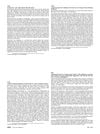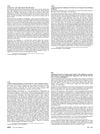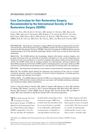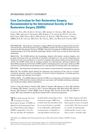 2 citations,
October 2008 in “The Journal for Nurse Practitioners”
2 citations,
October 2008 in “The Journal for Nurse Practitioners” The document concludes that managing PCOS requires a comprehensive approach, including lifestyle changes and medication, to improve symptoms and reduce health risks.
 1 citations,
April 2019 in “Advances in Cosmetic Surgery”
1 citations,
April 2019 in “Advances in Cosmetic Surgery” Platelet-rich plasma shows potential for hair growth, but more research is needed to determine the best preparation method.
 1 citations,
July 2018 in “Elsevier eBooks”
1 citations,
July 2018 in “Elsevier eBooks” Heredity and hormones cause common hair loss, and topical minoxidil is the first recommended treatment.
 1 citations,
September 2017 in “Journal of Investigative Dermatology”
1 citations,
September 2017 in “Journal of Investigative Dermatology” Blocking a specific enzyme can reduce the negative impact of stress hormones on hair growth cells.
 1 citations,
January 2017 in “Expert opinion on orphan drugs”
1 citations,
January 2017 in “Expert opinion on orphan drugs” Adalimumab is the most effective treatment for severe hidradenitis suppurativa, but more research is needed to improve treatment options.
 1 citations,
May 2013 in “Journal of the Egyptian Women's Dermatologic Society (Print)”
1 citations,
May 2013 in “Journal of the Egyptian Women's Dermatologic Society (Print)” Women with hair loss have higher heart disease risk and unhealthy cholesterol levels.
 1 citations,
August 1994 in “Journal of Cutaneous Pathology”
1 citations,
August 1994 in “Journal of Cutaneous Pathology” Hair loss happens due to faster cell growth and fewer cells in affected follicles.
 June 2024 in “Research Square (Research Square)”
June 2024 in “Research Square (Research Square)” Copper deficiency is linked to post-COVID-19 hair loss in women.
 April 2024 in “International journal of women's health”
April 2024 in “International journal of women's health” Adult female acne is a complex condition that can worsen with menopause, requiring holistic treatment and tailored skincare at different life stages.
 April 2024 in “The Egyptian Journal of Hospital Medicine ”
April 2024 in “The Egyptian Journal of Hospital Medicine ” Current treatments for androgenetic alopecia manage symptoms but don't cure it, and it affects social and psychological well-being.
 February 2024 in “International journal of biology, pharmacy and allied sciences”
February 2024 in “International journal of biology, pharmacy and allied sciences” Plant-based treatments can effectively and safely treat hair loss.
 January 2024 in “Journal of Natural Remedies”
January 2024 in “Journal of Natural Remedies” Solanum nigrum extract may help regrow hair.
 December 2023 in “International Journal of Applied Pharmaceutics”
December 2023 in “International Journal of Applied Pharmaceutics” Moringa seed oil helped hair growth in rabbits, with the highest dose being most effective.
 July 2018 in “Elsevier eBooks”
July 2018 in “Elsevier eBooks” Some drugs can cause reversible hair loss, but certain chemotherapy drugs may lead to permanent hair loss; drugs can also change hair color and texture.
 September 2017 in “Journal of Investigative Dermatology”
September 2017 in “Journal of Investigative Dermatology” Certain miRNAs might be involved in a hair loss condition called frontal fibrosing alopecia and could possibly help in its diagnosis.
 September 2017 in “Journal of Investigative Dermatology”
September 2017 in “Journal of Investigative Dermatology” Researchers created human cells that can turn into sebocytes, which may help study and treat skin conditions like acne.
 January 2017 in “Springer eBooks”
January 2017 in “Springer eBooks” The document explains various skin conditions and their treatments.
 May 2015 in “Journal of The American Academy of Dermatology”
May 2015 in “Journal of The American Academy of Dermatology” A heart transplant patient developed a skin condition called epidermodysplasia verruciformis after taking immune-suppressing drugs.
 May 2015 in “Journal of The American Academy of Dermatology”
May 2015 in “Journal of The American Academy of Dermatology” A woman was injured by a hedgehog falling on her, causing skin lesions but no disease.
 March 2014 in “Journal of The American Academy of Dermatology”
March 2014 in “Journal of The American Academy of Dermatology” Azathioprine may help with severe hair loss, a new topical treatment could counteract hair thinning, and trichoscopy can diagnose hair-pulling disorder effectively.
 March 2014 in “Journal of The American Academy of Dermatology”
March 2014 in “Journal of The American Academy of Dermatology” Azathioprine may be an effective treatment for severe hair loss.
 March 2014 in “Journal of The American Academy of Dermatology”
March 2014 in “Journal of The American Academy of Dermatology” Azathioprine treatment led to rapid hair regrowth in a woman with alopecia universalis.
 June 2008 in “Dermatologic Surgery”
June 2008 in “Dermatologic Surgery” The International Society of Hair Restoration Surgery created a standard curriculum in 2008 to guide doctors in diagnosing and treating hair loss effectively.
 January 2006 in “Dermatologic Surgery”
January 2006 in “Dermatologic Surgery” The Core Curriculum for Hair Restoration Surgery aims to improve doctor training for better, safer, and more natural-looking hair loss treatments.

Avicennia marina extract and avicequinone C can potentially promote hair growth and treat hair loss by interfering with hair loss mechanisms and boosting growth factors.
 March 2023 in “International Journal of Advanced Research in Science, Communication and Technology”
March 2023 in “International Journal of Advanced Research in Science, Communication and Technology” Various medicinal plants like Polygonum multiflorum, Red ginseng extract, and Zizyphus jujuba can potentially treat hair loss, offering benefits like low cost and multiple ways of working. Other effective natural substances include Pygeum africanum, Seneroa, Urtica dioica, and more.
 December 2022 in “Scholars journal of applied medical sciences”
December 2022 in “Scholars journal of applied medical sciences” Dutasteride 0.5mg improves hair growth in 78% of people with hair loss, but may cause sexual problems in some.
 June 2022 in “International journal of drug delivery technology”
June 2022 in “International journal of drug delivery technology” Convolvulus arvensis ethanolic extract can potentially promote hair growth and reduce hair loss.
 January 2022 in “Journal of Healthcare Sciences”
January 2022 in “Journal of Healthcare Sciences” Male Androgenetic Alopecia, a common hair loss in men, can be slowed and partially restored with treatments like minoxidil and finasteride, or hair transplantation. Serenoa repens may be an alternative treatment. More research is needed for new treatments.
 277 citations,
July 2011 in “Journal of the Dermatology Nurses’ Association”
277 citations,
July 2011 in “Journal of the Dermatology Nurses’ Association” The skin's layers protect, sense, and regulate the body's internal balance, but can be prone to cancer.





























